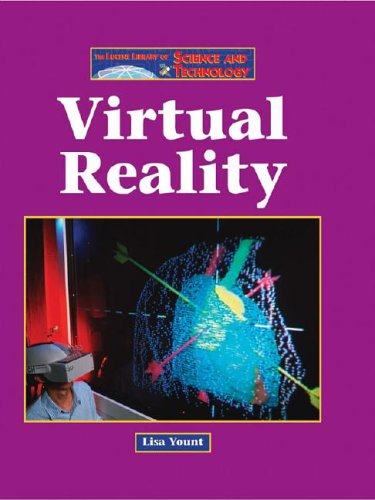-
Bacteria and Viruses
Peggy Thomas
Hardcover (Lucent Books, May 21, 2004)They are responsible for some of the deadliest diseases, yet they play a vital role in maintaining life on earth. In Bacteria and Viruses, learn about the scientists who found them, how we fight the harmful ones, and how beneficial microbes can be used to improve our lives. Z
Z
-
The Lucent Library of Science and Technology - Black Holes
James Barter
Hardcover (Lucent Books, Nov. 7, 2003)The remains of collapsed stars, black holes possess enormous gravities that pull in and annihilate any matter that strays too close. The latest evidence and theories for these bizarre objects are presented in this intriguing book, including how black holes were first predicted, how they form, their physical properties, and how scientists detect them. Also covered are the giant black holes now known to lurk at the centers of most galaxies and the possibility of using these objects as cosmic gateways. Z
Z
-
The Lucent Library of Science and Technology - Telescopes
James Barter
Hardcover (Lucent Books, Oct. 29, 2004)Ancient Greek and Egyptian scientists dreamed of viewing Earth's distant cousins scattered throughout the solar system but it was not until the early seventeenth century that telescopes made such dreams a reality. Simple telescopes provided the first extension of eyesight that shifted authority in the observation of the universe from men to instruments. Within a short time, telescopes defined the universe and ignited an interest in knowing the universe's origins and possibly even its eventual demise. Enormous improvements in telescopes in the twentieth century captured and focused the light from bodies billions of light years away. Newer ones even captured X-rays and Gamma rays that better defined the known universe. As the end of the century drew near, the Hubble telescope was launched into orbit to beam back the most dazzling photographs of the most distant bodies ever detected. Because of telescope improvements, astronomers have added a new quest in understanding the universe, the search for life beyond Earth. Z+
Z+
-
Computer Viruses
Harry Henderson
Hardcover (Lucent Books, Nov. 7, 2003)Describes what computer viruses and worms are and how they work, why people would want to create and send viruses, the damage viruses, worms, and spam can cause, and what laws and measures are in place to prevent this damage. W
W
-
The Lucent Library of Science and Technology - Energy Alternatives
Gabriel Cruden
Hardcover (Lucent Books, Aug. 27, 2004)Energy drives all life and is a key component to how humanity works, lives, and sustains itself. Due to the depletion of existing energy sources and the damage being done to the earth's ecosystems, renewable, non-polluting energy sources such as solar, wind, and geothermal power, are being developed and implemented. Z
Z
-
Artificiall Intelligence
Peggy Thomas
Hardcover (Lucent, Feb. 18, 2005)This wide-ranging series explores environmental phenomena such as global warming, astronomical wonders such as black holes, and life-altering inventions such as lasers. Vivid, informative narrative and fully documented quotes enhance each volume in the series. All books include annotated bibliographies and an index. Y
Y
-
The Lucent Library of Science and Technology - Virtual Reality
Lisa Yount
Hardcover (Lucent Books, Aug. 20, 2004)Virtual reality uses computer graphics, sound, and even touch to make users feel part of imaginary worlds. It's a star of high-tech entertainment, but it also has serious uses in education, science, and business. In the future it may change the way people feel about "real" reality.
-
Comets and Asteroids
Don Nardo
Hardcover (Lucent, Nov. 7, 2003)Discusses comets and asteroids and how scientists have studied them throughout history, describes their characteristics, and explains what happens when they collide with Earth. R
R
-
The Lucent Library of Science and Technology - Genetics
Robert Taylor
Hardcover (Lucent Books, Oct. 17, 2003)Far more than the discovery of DNA and gene structure, genetics in the twenty-first century is an applied science. Genetics clearly describes both basic scientific principles and how genetics is used in mapping and manipulating the genetic code, engineering and cloning plant and animal species, predicting and curing disease, and fighting crime.
-
Lasers
Don Nardo
Hardcover (Lucent, May 5, 2003)Discusses the scientific discovery and development of the use of high intensity light, called laser, and its use in our daily lives.
-
The Lucent Library of Science and Technology - The Search for Extraterrestrial Life
Don Nardo
Hardcover (Lucent Books, Jan. 6, 2006)Scientists have long suspected the the human race is not alone in the universe. Although no direct evidence for ET life has yet been found, a great deal of circumstantial evidence suggests that it will be found in the near future. Since 1995, scientists have detected more than 120 planets orbiting other stars. And oceans of liquid water have been located beneath the surfaces of several moons in our solar system. This fascinating volume explores the scientific probabilities of ET life and current scientific efforts to find it. Y
Y
